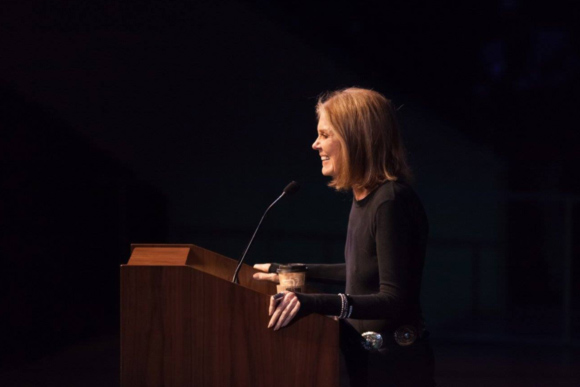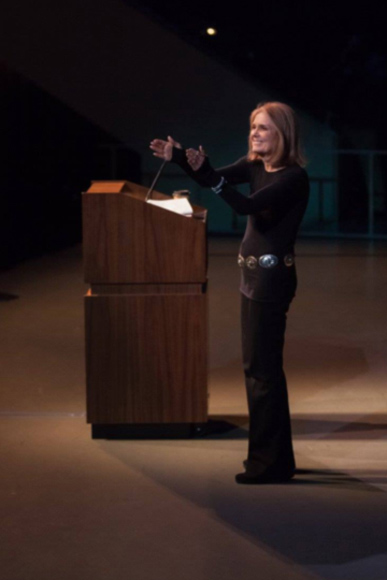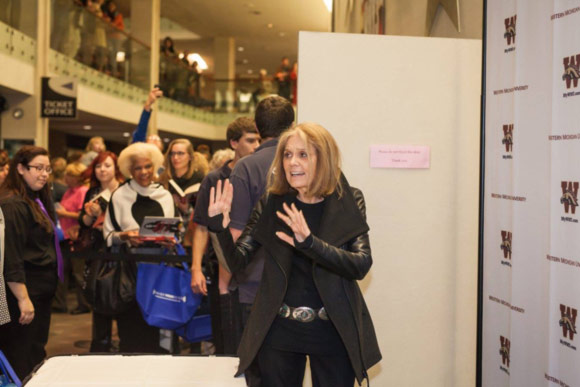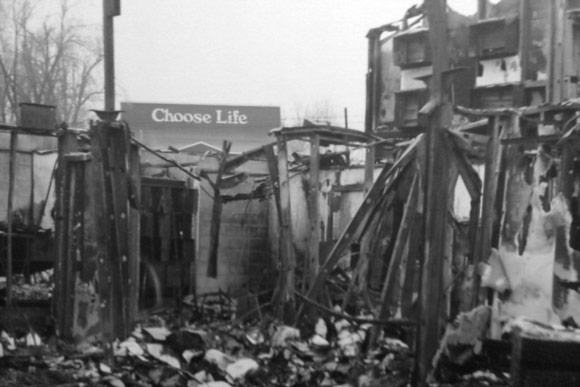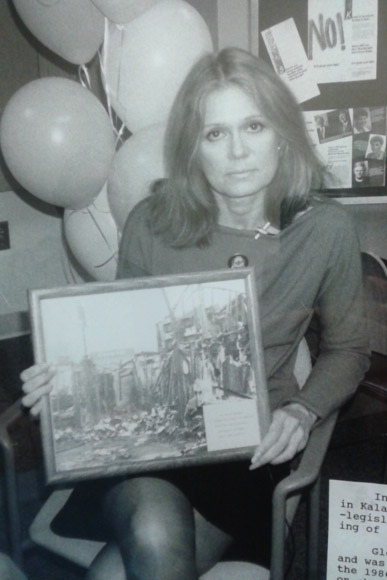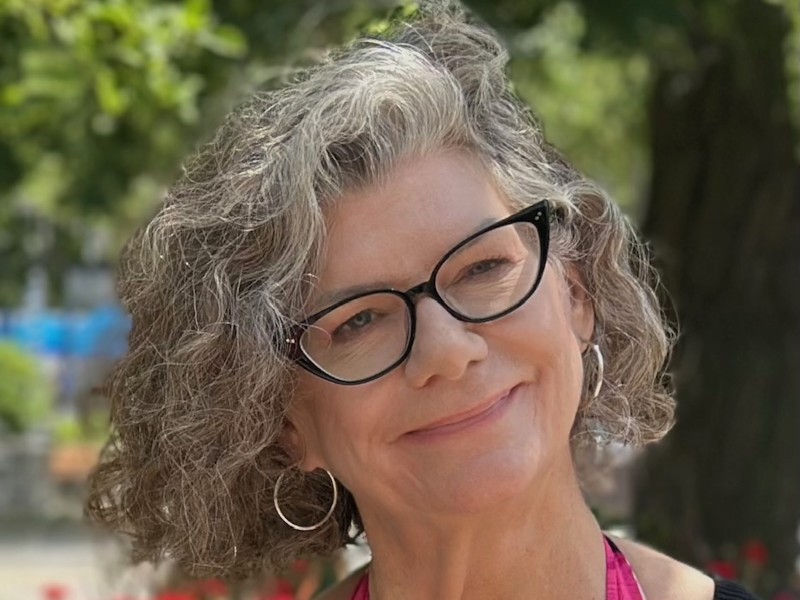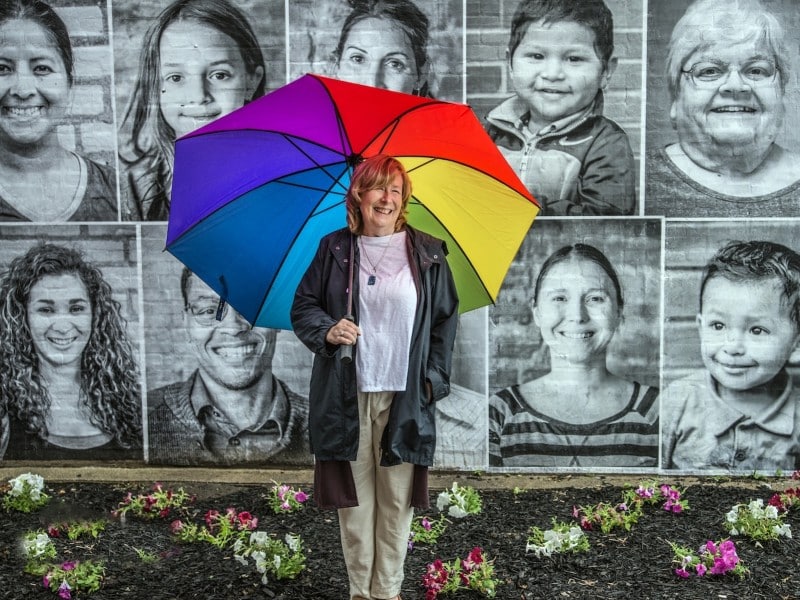Gloria Steinem packs Miller, sends crowd home inspired
Gloria Steinem's Kalamazoo visit brings back local memories and a reminder that her leadership in the feminist movement is still as relevant as ever.
It’s the day of the Gloria Steinem event at Miller Auditorium and the day after Planned Parenthood of Kalamazoo’s former CEO Louise Safron’s memorial service when I pick up the phone to call Meg Smille. I want to hear from someone about Gloria Steinem’s visit to Kalamazoo shortly after the arson that destroyed the Kalamazoo clinic in December of 1986, and I’m told Meg will remember. She is the retired CFO of the clinic, employed there at the time of the attack.
Unaware as I was of the memorial service the prior evening, when I find out about it I feel a little insensitive asking Meg to share her stories with me. It’s clear the pain of the loss of her friend, colleague, and admired leader is felt very deeply, but it soon becomes apparent that the story sharing is a sort of conjoined catharsis and reopening of old wounds, and they’re connected at the heart. There is a lot of sighing, a lot of lingering on the words connected to the memories of it all.
“I can still smell the smell,” she says after a deep breath. The word she keeps repeating when asked to recall information from the arson is “traumatic.” And it’s viscerally clear why so many have used the word terrorism to describe these acts of destruction aimed at women’s clinics, their employees, and the patients who use them. The fear, devastation and despair are palpable in her voice as if it just happened yesterday.
“I got a call from Louise (Safron), the executive director, at 1:30 or 2 in the morning, saying that the building had burned and not to come down there… well, I came down,” she recalls. “It was a little bit snowy and, of course, it was very dark. And what we were told from the people in the neighborhood is that the flames shot 20 to 30 feet into the air,” Smillie says.
The arsonist, who was never caught, had drilled a hole in the roof over the administrative area, poured in a flammable liquid and lit it up. Everything but the surgical area was destroyed.
“Luckily we had a strong leader. She was the woman we were memorializing last night. We got a lot of community support. And we got through it and rebuilt–a bigger and better place on the same site. But, it wasn’t easy getting there, and it was very traumatizing.”
Smillie says the staff was serving people the next day after the fire, providing advice at the YWCA, the health department, and community centers. The clinic relocated to a temporary location and they were offering clinical services within a few weeks. By February of 1987, they were back to offering abortions and vasectomies, and in early 1988 they had rebuilt and were back to offering full services, including female sterilizations.
Steinem lends empathy and solidarity
It was shortly after the arson that a 1988 state-wide ballot proposal brought further attention to anti-choice efforts. Proposal A would prohibit the appropriation of public funds to pay for welfare abortions unless the abortion was necessary to save the life of the mother. The measure subsequently passed, but not without public scrutiny, including from high-profile activists, like Gloria Steinem, who paid a visit to Kalamazoo in October of 1988.
“Her visit gave me hope, gave me courage, it re-inspired me,” Smillie says. She acknowledges her 37 years working for Planned Parenthood, and says she was already pretty inspired, but, “Having Gloria Steinem come… I’ve known of her forever. It really reinvigorated everybody.” Steinem visited the Kalamazoo Planned Parenthood clinic and spoke at a fundraising luncheon at no charge, with all proceeds going to efforts to defeat the ballot measure.
Steinem in Kalamazoo 27 years later
Twenty-seven years later, it’s troubling to consider how similar the fight for reproductive freedom still is. As I watch the auditorium fill up on the night of Steinem’s lecture, I’m noting the diversity in the attendees. As social movements evolve and morph over time, I’m marveling at the ability of such an iconic leader to remain so relevant throughout so many waves of feminism.
Steinem’s rise in Second Wave Women’s Liberation was catapulted by her undercover journalism exposing the conditions in Hugh Hefner’s Playboy Club in New York City in the 1960’s. Later, in 1972, Steinem co-founded Ms. Magazine and remained their editor in chief for 15 years. At 81 years old, she has spent her lifetime on the road – first as a child to wanderlust parents, and later as an adult activist – something she writes about in her recently released memoir, My Life on the Road.
When she emerges to take the stage, the crowd erupts in an ovation. Steinem begins with a joke about the crowd facing her, and her as a solo speaker to the 3,000 attendees as being “…based on hierarchy, which is based on Patriarchy,” and apologizes for the dynamic and promises that later in the evening we will organize together.
Steinem has been invited as the concluding speaker for the Raise Your Voice series, hosted by WMU’s Lee Honors College, which has spent the past year inviting speakers to address the issue of gender-based violence. Steinem begins by talking about the many forms of violence faced by women the world over-–including domestic violence, to which she gives context by relaying the following statistic: more U.S. women have been killed by their partners since 9/11 than the people who died in the attacks and the resultant wars, combined.
But, to be expected, Steinem circles back to talking about reproductive health and choice because, she says, “You can’t perpetuate all other oppressions without controlling reproduction.” Steinem has been famously quoted since the early 1970’s as saying, “If men could get pregnant, abortion would be a sacrament.” And it seems, 40 years later, with a mostly male-led political attack on women’s access to reproductive health choices and options, this statement still holds the same punch that it did decades ago.
Still relevant to younger generations
Linda Hanes is a senior Honors Student at WMU. She is a sexual health peer educator at the campus’ Sindecuse Health Center, and she also volunteers with Planned Parenthood. She says that through her work and volunteering, she has found a passion for feminism and reproductive health care activism. Hanes competed in an essay-writing contest offered to Honors Students for an opportunity to attend a private reception with Steinem prior to her lecture and she succeeded in landing a spot.
“The reception was exciting but also intimidating,” Hanes says. “I mean suddenly here was this idol, literally the first person I googled when I heard about feminism, and she was standing right in front of me. It felt like there were a million people there, but she stopped to talk to every single person. When I finally got to meet her, I was with my professor and her daughter and my professor thanked Steinem for all of her work and Steinem turned to us and said, ‘No. Thank you.’ At that point, I felt like I was going to burst into tears right there. It felt like she was saying in so many words that one of us is not more successful than all of us if we are working towards a common goal. It was humbling and empowering all at the same time.”
Hanes goes on to say that she finds Steinem’s feminism still relevant today and points to the number of moments in her lecture, where she addressed the various intersections of feminism. “I could see during her lecture that her feminism has evolved to embrace modern feminism, including the message that gender is all made up by society and that misogyny and racism are not mutually exclusive.”
Shattering the authoritative model of activism
Humility, empathy, and brutal truth-telling are not often traits that go hand-in-hand, but Steinem embodies each as though it were the most natural thing in the world. And she is in notable contrast to many other people doing front line work in the spotlight.
Steinem sees liberation as a collaborative effort. She says in My Life on the Road, “I’m also now immune to politicians who say: ‘I’ve traveled the length and breadth of this great land, and I know….’ I’ve traveled more than any of them, and I don’t know.”
Her politically timely comment asks us to consider the complexity of our lives and how a soundbite about another’s experience could never reflect the diversity of our lives. Which is likely also why she said in her book and at the lecture, “the simplest path to deep change is for the less powerful to speak as much as they listen, and for the more powerful to listen as much as they speak.”
After Steinem accepted the Presidential Medal of Freedom from President Obama in 2013, she said, “Don’t listen to me. Listen to yourself…People often ask me at this age, ‘Who am I passing the torch to?’ First of all, I’m not giving up my torch, thank you! I’m using my torch to light other people’s torches. … If we each have a torch, there’s a lot more light.”
Part of the way that she is lighting other people’s torches is by supporting a new wave of “truth-telling,” surely a nod to the Consciousness Raising that defined the Second Wave of the ’60s and ’70s, and which is playing out today in events like Abortion Speak-Out’s, geared at shattering the shame and stigma that comes with silence.
Steinem’s memoir opens with a moving dedication to a Dr. Sharpe, who performed an illegal abortion for a 22-year-old in 1957. She tells how the doctor instructed the woman to never tell his name and to also do whatever she wanted with her life. The dedication concludes, “Dear Dr. Sharpe, I believe you, who knew the law was unjust, would not mind if I say this so long after your death: I’ve done the best I could with my life. This book is for you.”
I’m pretty sure he’d not only be OK with her sharing this story but that he’d be as impressed and as inspired as I am.
Kathi Valeii is a writer, speaker, and activist living in Kalamazoo. She writes about gender-based oppression and full spectrum reproductive rights at her blog, birthanarchy.com.
Pictured: In 1988, Gloria Steinem campaigned in Kalamazoo for a NO vote on Proposal A — legislation to prohibit Medicaid funding of abortion in Michigan. Gloria visited Planned Parenthood and was presented with a photograph of the 1986 arson. The “Choose Life” sign on the church across the street looms above the charred building in the picture. Referring to the sign in the photo, Gloria autographed a campaign brochure: “This (the arson) is terrorism too — and a woman’s life is a human life.”

